Xinjiang Uygur Autonomous Region in the border area of Northwest China covers about 1.66 million square kilometers, accounting for one-sixth of Chinese land territory. Long-term stability in Xinjiang is vital to the whole country’s stability and national security.
Chinese President Xi Jinping has always attached great importance to its development. He has gone to Xinjiang for inspection, participated in the deliberation of the Xinjiang delegation during the two sessions, presided over a meeting to discuss Xinjiang’s reform, development and stability, and written back to the descendants of the Uygur national model worker “Uncle Kuerban.”
Advantaged industry
Xi made an inspection tour to Xinjiang in April 2014 and visited Xinjiang Fruit Industry Group Co., Ltd in Urumqi.
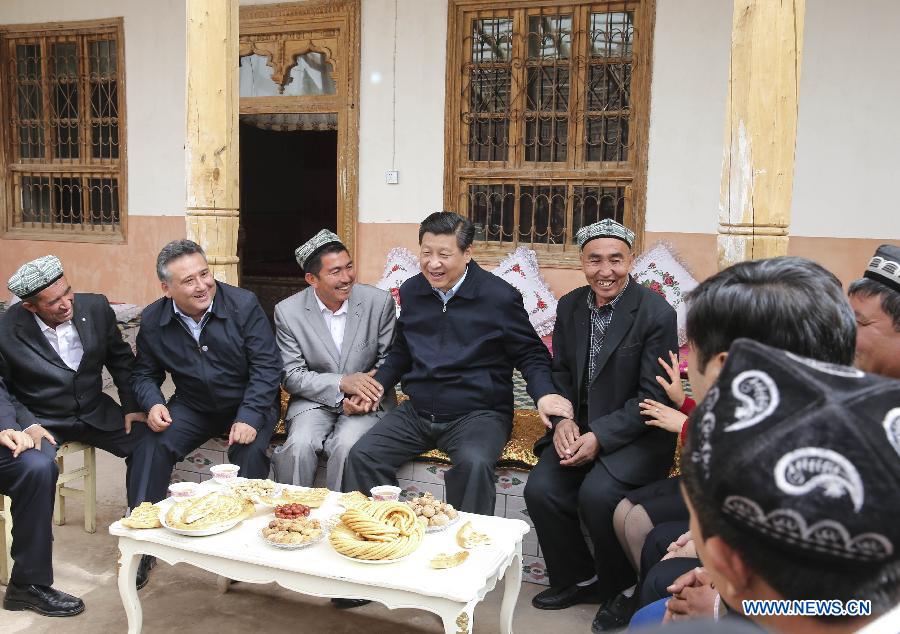
Chinese President Xi Jinping (4th L) talks with local people while visiting a villager's home in Tokkuzak Township, Shufu County, Northwest China's Xinjiang Uygur Autonomous Region, April 28, 2014. (Photo: Xinhua)
Xi listened to an introduction at the company’s exhibition hall and was invited to try the dried fruits. He praised the apricots as “flavorful” and jujubes as “tasty.”
Xi picked up a bag of raisins and inquired if the farmers used fertilizer. Seeing that a packet of Khotan jujube was priced at 190 yuan ($28), he asked about farmers’ profits.
Xi also asked about the development prospects of the fruit industry.
Questions included:
“Have you created your brand?”
“Fruits in Xinjiang share many similarities with those in Central Asia, so how will you further hold your advantages?”
During his inspection, Xi recalled the old stories of educated youth joining the Xinjiang Production and Construction Corps (XPCC) in the 1960s and 1970s.
“I was in northern Shaanxi at that time and longed to come here," Xi said. He then recalled a famous poem by Su Dongpo, a famous litterateur of the Northern Song Dynasty (960-1127).
"Eating three hundred lychees everyday, I would long to live in Lingnan." In the poem, Su expressed his love for the subtropical fruit and wished he could forever stayed at its mainly planted region, Lingnan area, which now consists of provinces of Guangdong, Fujian and Taiwan and the Guangxi Zhuang Autonomous Region.
"The baked Nang bread, Xinjiang pilaf, mutton kebabs, Hami melons and grapes make us confident to say ‘I would like to live in Xinjiang forever,’” Xi said.
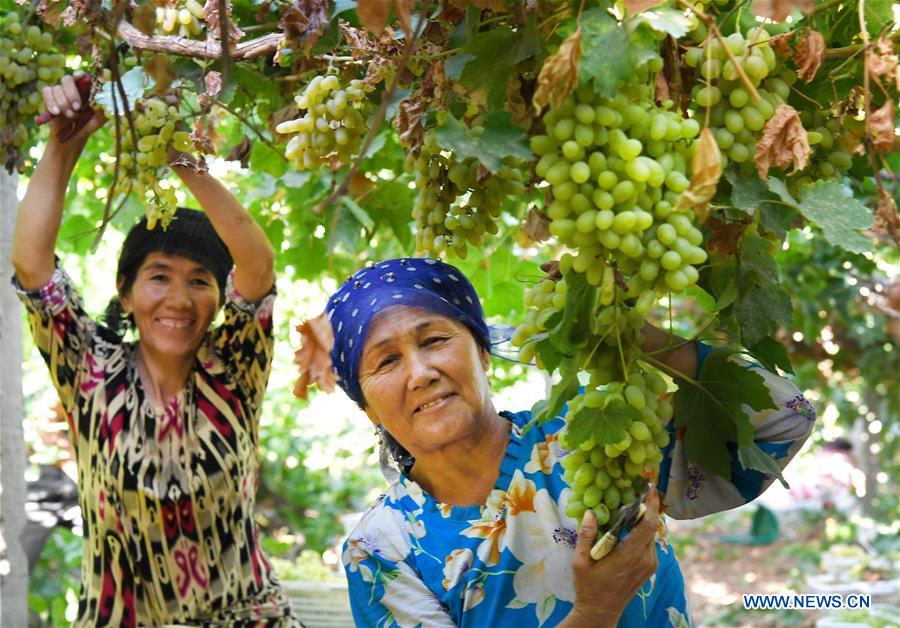
Farmers pick up grapes in Putao (Grape) Town of Turpan, Northwest China's Xinjiang Uygur Autonomous Region, Aug. 29, 2017. (Photo: Xinhua)
When Xi participated in deliberations of the Xinjiang delegation during the Fifth Session of the 12th National People’s Congress (NPC) in March 2017, he said, “We must implement new development concepts” and “foster characteristic and advantaged industries.”
National unity
In March 2017, at the Fifth Session of the 12th NPC, a deputy showed a picture of the families of “Uncle Kuerban” to Xi during the deliberation of the Xinjiang delegation.
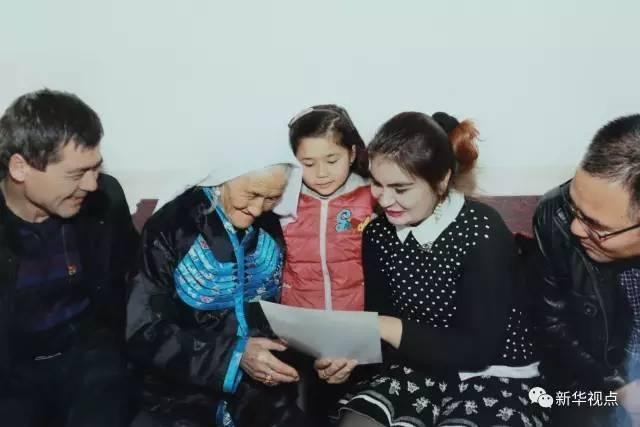
People look at a picture of the families of “Uncle Kuerban.” (Photo: Xinhua)
“Uncle Kuerban,” Kuerban Tulum, is a Uygur farmer from Xinjiang’s Yutian County. In the 1950s, he thought of “riding a donkey to Beijing and visiting Chairman Mao” to express his gratitude for deliverance and liberation. “Uncle Kuerban” was later received twice by Chairman Mao.
In January 2017, Xi wrote to Kuerban Tulum’s descendants: “I hope you can exemplify as a big family who loves the Party, the motherland and the Chinese nation, and promote the people of all ethnic groups to cling together tightly like pomegranate seeds and create a better future for Xinjiang under the leadership of the Party like your forefather.”
Religious harmony
In April 2014, during his inspection in a village in Tokkuzak Town of Shufu County in Xinjiang, Xi specifically inquired about mosque management and villagers’ religious activities to Tursun Malayti, the imam.
Tursun told Xi that he always preached the Party’s good policies during his sermon for the masses’ better comprehension.
“That’s a good practice,” said Xi. Religions should be suited to the socialist society. Actively promoting concepts conducive to socialist construction would enable people to live a happy life, he said.
In a socialist family, only with national unity and religious harmony can all undertakings achieve prosperity, Xi noted.
On religious work, Xi has said, “The major part of Xinjiang’s mass work lies in ethnic unity and religious harmony.”
At the Second Central Xinjiang Work Forum in May 2014, Xi stressed the significance of carrying out religious work, actively promoting the accommodation of religions and socialism, and guiding religious personages and believers to play an active role in promoting economic and social development.
Stability maintenance
The establishment of XPCC in opening up wasteland and guarding the frontiers is the strategic layout of the Party Central Committee to strengthen the administration of border areas.
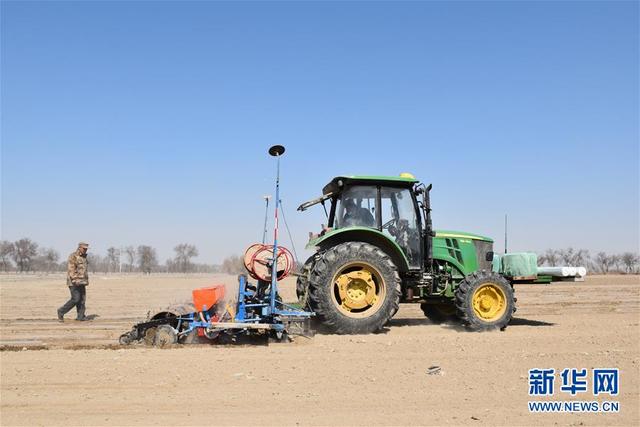
Xinjiang Production and Construction Corps soldiers plow the land in Xinjiang. (Photo: Xinhua)
“The corps must reinforce itself into a crucial stabilizer of the country’s border areas, safeguard national and ethnic unity, and maintain social stability in Xinjiang,” Xi said.
“The XPCC should scientifically deal with the relationship between wasteland reclamation and border garrisoning, the corps and local areas, and fulfill its duty in fundamental, basic and long-term issues.”
Over the past few years, Xi has put forward requirements for the construction of the corps at meetings including the Political Bureau meeting of the CPC Central Committee and the Second Central Xinjiang Work Forum.
In April 2014, Xi visited the Communist Youth League Farm run by the Sixth Division of the XPCC in the rain and talked with the cadres and workers at a symposium.
“I am an ordinary soldier of the 185th Regiment in the 10th Division of the XPCC,” said Ma Junwu, recalling his 26 years guarding the China-Kazakhstan border.
The post was surrounded by gobi, weeds and sand dunes, only 5 meters from the border river. Scarcity of electricity ended in 2006.
Ma had served for 26 years through winter frosts and summer mosquito bites with endurance and willpower.
“Good job. I admire your dedication,” Xi said. “How often can you see someone?”
Ma replied, “More often, and there are tourists coming here. In the past, I couldn’t see anyone during the wintertime.”
“Good job,” Xi said once again.
Xi stressed the development of the corps was “absolutely not a temporary improvisation but a long-term strategy.”
“Under the new situation, the work of the corps can only be strengthened, not weakened,” Xi said.
Better life
A widespread saying among the older generation portrays Daxi thus: “overrun with alkali lands and so the harvest fails and the lives are hard. Adults are singing with hunger and children are dressed in rags. We hope the bitter days come to an end and sweet days will come soon.”
The once-poor village has undergone great changes and named a “star village of the national well-off construction.”
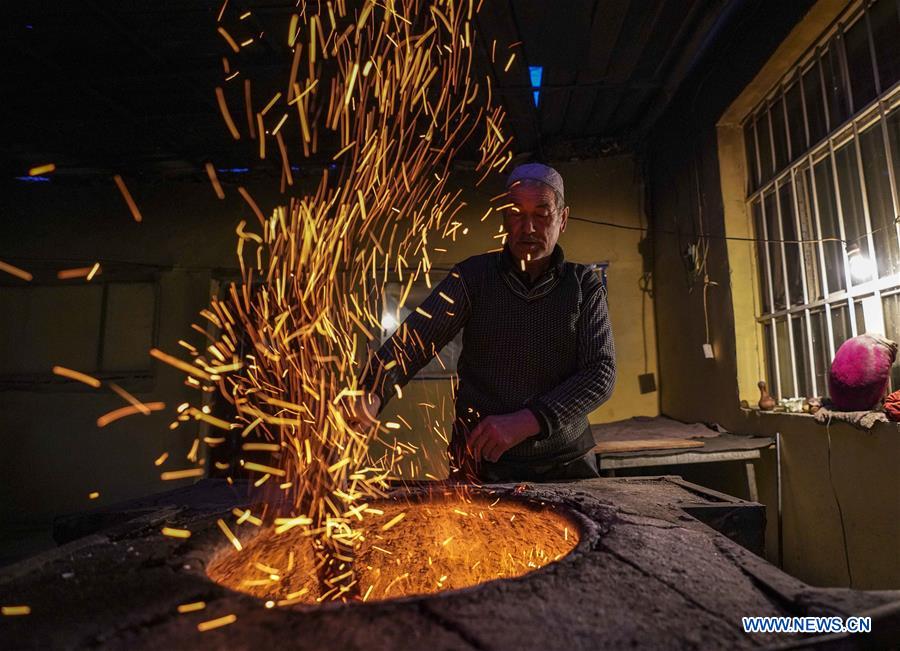
A baker puts the wood fire in an oven used to bake "Nang", a kind of crusty pancake, at Daxi Village of Yuli County, Northwest China's Xinjiang Uygur Autonomous Region, Jan. 29, 2019. Daxi Village is famous for its "Nang" making. The village has been committed to promoting rural tourism, of which "Nang" making constitutes an integral part, also a way to boost farmers' income. (Photo: Xinhua)
Xi has always expressed concern about Daxi.
In June 2009, Xi visited the village to inspect grassroots Party construction work. In April 2014, he mentioned the village during his inspection tour of Xinjiang.
In September 2014, Xi wrote to Shawur Manlik, the Party Secretary of Daxi, and the villagers: “I have been concerned about you all the time.”
In the letter, Xi noted that the changes of Daxi Village indicated that with the Party’s good policies and the concerted efforts of all ethnic groups, villagers are sure to live a happy life.
Xi stressed that the grassroots play a significant role in facilitating prosperity and stability in Xinjiang.
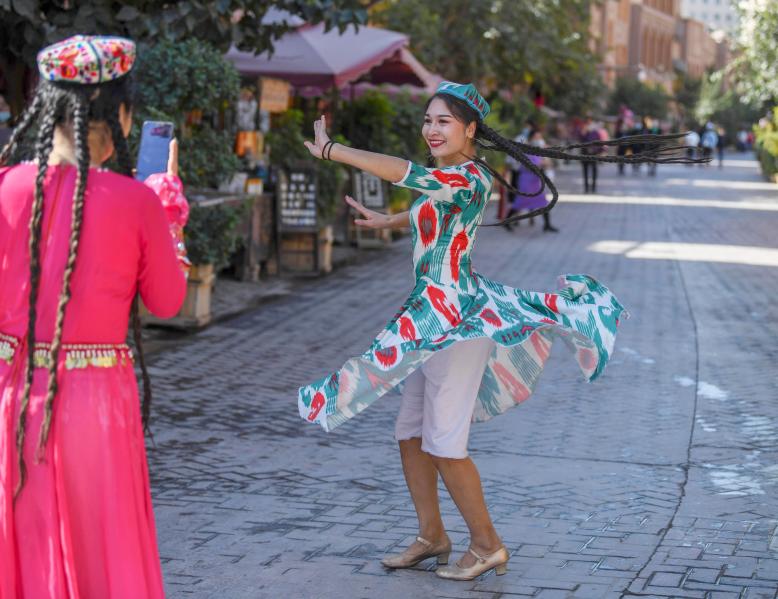
Residents have fun in the ancient city of Kashgar, Northwest China's Xinjiang Uygur Autonomous Region, Sept. 20, 2020. (Photo: Xinhua)
The Village Party branches should give full play to their role as a fighting fortress, unite the villagers as closely as magnets, strengthen determination and confidence to follow the Party, implement the Party’s good policies in every household, improve production and national unity, and bring the villagers a better life.
(Translated by Li Yiran; Original story from Xinhua; Edited by Huang Jingjing and Lv Fu)


